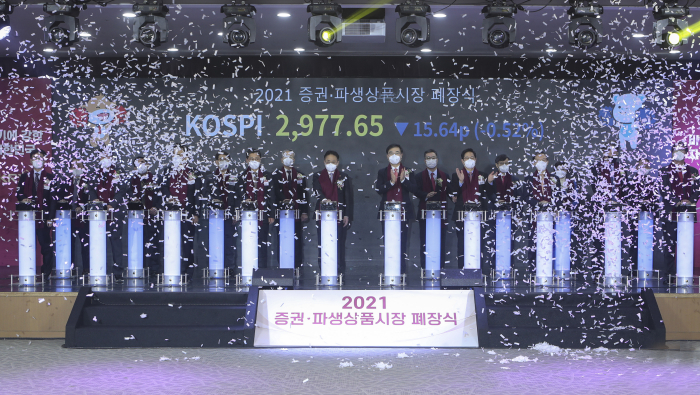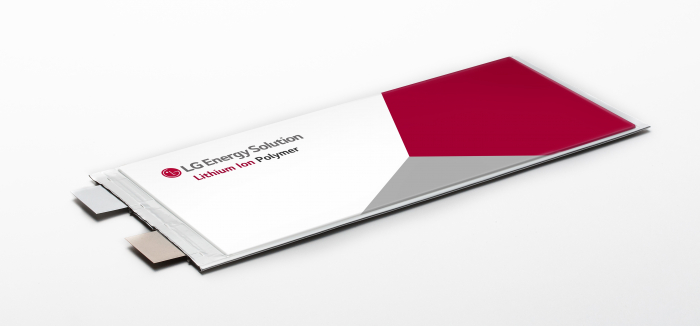Stock markets
Kospi in lethargic trade ahead of LG Energy debut
By Monday's close, institutional investors had already dumped a net $5.2 bn in S.Korean shares so far this month
By Jan 18, 2022 (Gmt+09:00)
2
Min read
Most Read
LG Chem to sell water filter business to Glenwood PE for $692 million


Kyobo Life poised to buy Japan’s SBI Group-owned savings bank


KT&G eyes overseas M&A after rejecting activist fund's offer


StockX in merger talks with Naver’s online reseller Kream


Mirae Asset to be named Korea Post’s core real estate fund operator



South Korea's benchmark stock index Kospi declined to its lowest closing level in one and a half months on Monday, moving in the opposite direction of other major Asian stock markets such as Tokyo and Shanghai.
Large-cap and growth stocks with high price-to-earnings ratios suffered heavy selling. Investors priced in the Federal Reserve's quickening pace of interest rate hikes after the US consumer inflation hit a nearly four-decade high of 7% last month.
Further, the Jan. 27 stock market debut of LG Energy Solution Ltd. pushed institutional investors to unload their holdings to create space for the world’s second-largest battery maker in their portfolios.
The Kospi index was traded 0.12% lower to 2,886.60 around Tuesday noon, after closing down 1.09% at 2,890.10 on Monday. It was the first time for the benchmark index to fall below the 2,900 level since Dec. 1 of last year, when it finished at 2,899.72.
Since the start of this month, Kospi has shed about 3%, bucking its previous trend of rising every January since 2018.
Institutional investors have dumped a net 6.2 trillion won ($5.2 billion) worth of domestic stocks so far this month by Monday's close.
That was in stark contrast to their massive net buying of 4.3 trillion won on the main bourse last month and compared with net selling of 1.2 trillion won in November of last year.
"Funds that fail to have enough shares of what is set to be the second-largest stock will be unable to match the returns of the benchmark index," said IBK Investment & Securities' head of research Chung Yong-taek.
During the two-day bookbuilding process last week, LG Energy received the highest amount of bids ever in South Korea, worth 11,500 trillion won ($9.7 trillion).
It is poised to become the country's biggest-ever IPO, raising as much as 10.2 trillion won and the second-most valuable company after Samsung Electronics.

On Monday, institutional investors sold a net 259.4 billion won worth of Kospi shares, with foreign investors unloading a net 253.4 billion won worth of shares.
Leading the market lower, Samsung Biologics dropped 2.82% and Hyundai Motor ended down 1.91%.
They were also dragged down by data showing slower-than-expected retail sales growth in China, the country's largest export market. China's retail sales growth slowed to 1.7% in December last year, from a 3.9% rise in November.
Among growth stocks, Kakao Pay and Kakao Bank tumbled to their one-year lows ahead of the expiration of the mandatory holding period of their stocks in the coming months.
Kakao Pay plunged 44% from its November high, extending its downward spiral triggered after its CEO Alex Young-joon Ryu disposed of $39 million worth of shares in the fintech company.
Analysts recommend investors take a conservative stance on the domestic stock market, which is expected to stay in a boxed range for the time being.
On the contrary, Growth Hill Asset Management CEO Kim Tae-hong said it is time to start bargain hunting.
"Historically, stock indices have tended to drop around 10% on average in the first or two months after the first round of rate hikes took place, but they recovered the losses in the following five to six months, exceeding their previous highs," he said.
Write to Sung-Mi Shim at smshim@hankyung.com
Yeonhee Kim edited this article.
More to Read
-
 IPOsLG Energy sets new IPO record with $9.65 trillion investor demand
IPOsLG Energy sets new IPO record with $9.65 trillion investor demandJan 12, 2022 (Gmt+09:00)
3 Min read
Comment 0
LOG IN


